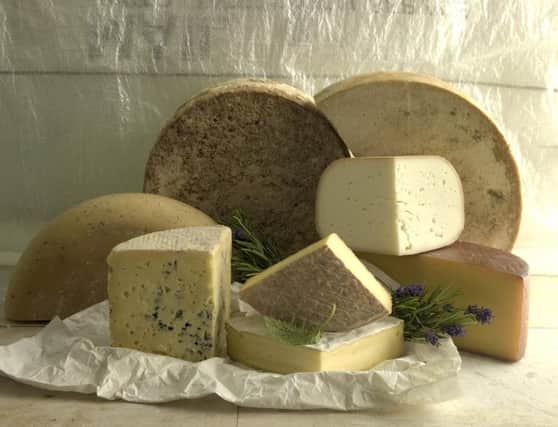What's not to love about our own Northern Ireland cheeses?


One of the speakers was Charlie Turnbull, a cheese expert based in the town of Shaftesbury in Dorset. Cheesemaking in Northern Ireland is a relatively new artisan craft. Sue McCloskey, from Loughguile, started the movement with her wax covered, hexagonal truckles of Cheshire type cheeses about 15 years ago. She has since retired but been replaced by a new round of cheesemakers, speckled across the country.
Paul McLean makes Kearney Blue, a slate grey crusted, blue cheese. I tried it at his house in Kearney on the Down coast about five years ago - with a toot of local sloe gin it’s now one of my favourite food memories. His was a relatively new business then and he was paving the way for a new influx of cheesemakers.
Advertisement
Advertisement
Mike Thompson started his cheese company with crowd funding and the resulting Young Buck blue cheese is now on cheese boards in restaurants across Ireland and acknowledged throughout the UK for its quality. Christo Swanpoel is a native South African, now living in Millisle who also makes excellent raw milk cheeses in the gouda style. Adam Kelly produces exemplary cheese and curd from his herd of goats at Leggygowan Farm outside Saintfield.
Kevin and Julie Hickey make cheeses in the Sperrins and their Dart Mountain Dusk variety won a Bronze medal at the 2014 World Cheese Awards – third in the world over thousands of French, English and Italian cheeses! Their Banagher Bold cheese is washed in ale from the North Bound Brewery. Washing cheeses in liquor is an age old tradition – Stinking Bishop is a prime example, where perry made from the Stinking Bishop pear anoints the cheese to produce a flavoursome and unique skin. The Banagher Bold is really worth sussing out and a perfect example of artisans working together.
All these wonderful cheese makers have only been around for the last five years. There’s more of an established cheese making community in the south of Ireland but it was brought there by Germans, Swiss and Austrians only in the past 40 years. According to Charlie Turnbull this is because of the Romans. They decided not to try and invade here because they thought Ireland was a land of barbarous butter eaters – so we lost out on their cheesemaking skills.
In our culture all excess milk was churned into butter. The only time cheese was made was at the birth of a child. It was called “crying cheese” and was a fresh, unaged version much like cottage cheese today. In her book the “Cookin Woman” Florence Irwin gives a recipe for Grewelthorpe cheese. A quart of lukewarm milk was mixed with a teaspoon of rennet and left in a warm place for 24 hours, then strained through muslin overnight until the whey is drained away. The process reminded me of being in a village in Italy and watching a local make ricotta cheese last year. A massive pot was placed over an open fire, stirred with a stick that had been pulled from a hedge and taken to a temperature that satisfied his finger, not an electronic probe. The curds were pressed into moulds and we picked some up the next day. It was fresh, redolent of the grassy surrounding pastures and utterly divine. With our sanitised universe nowadays, both Florence Irwin’s and the Italian method would sound alarm bells for environmental health officers. The fact is we’re all deficient in good bacteria and a run of raw milk cheese or curd would do us the power of good!
Advertisement
Advertisement
Cheesemaking is something you can do at home and is very satisfying. You can buy rennet but lemon juice, citric acid or vinegar works just as well and is a lot easier to source. My recipes this week are for pork meatballs combined with homemade cheese and a recipe for sugo sauce that makes the most out of tinned tomatoes. The resulting whey from the cheese is used for a whey loaf so no waste. Tasty, no waste, and a lot of satisfaction from making your own cheese – what’s not to love!